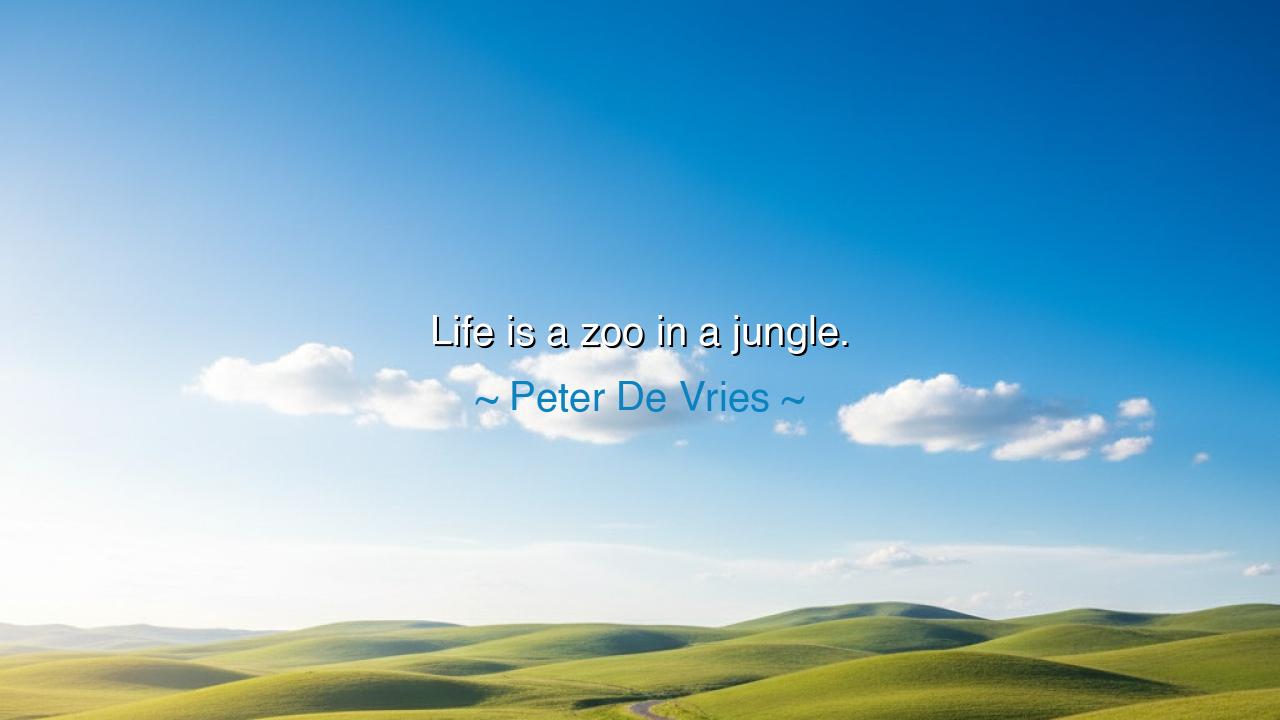
Life is a zoo in a jungle.






“Life is a zoo in a jungle.” — so declared Peter De Vries, the American novelist and satirist whose humor was edged with deep insight into the chaos of human nature. His words, deceptively simple, reveal a profound truth about the condition of mankind: that existence itself is both tamed and wild, ordered and chaotic, civilized and primal. De Vries, who wrote with both laughter and lament, looked upon the world and saw that though humanity builds cages of law, culture, and morality to contain its instincts, those instincts still roar beyond the bars. Thus, he called life a zoo in a jungle — a fragile sanctuary of order surrounded by the untamed wilderness of chaos.
The zoo represents the systems we have built to create meaning and safety. Civilization itself is a vast enclosure — with its rules, its religions, its politics, and its manners — all crafted to keep the savage instincts of man at bay. We polish the surface of life, feed our appetites in measured doses, and pretend that the world beyond our fences no longer exists. But the jungle still looms outside — the unpredictable, the dangerous, the uncontrollable forces of nature and human passion. Beneath the calm of daily life, the heart still beats with hunger, fear, and desire. And sometimes, that wildness breaks through.
History gives us countless examples of this truth. Think of the fall of Rome, once the mightiest zoo of civilization, its marble streets teeming with order and culture. Yet, behind its grandeur, greed and decay festered like vines in the dark. When the walls fell and the barbarians entered, it was not merely the jungle outside that conquered — it was the jungle within. The same men who once ruled through law and art gave way to violence and ruin. De Vries’s words remind us that the jungle is not somewhere far away; it lives in every human heart. Civilization is but a thin veneer, and the beast below is never far from waking.
Yet De Vries does not speak only with cynicism. There is humor and affection in his words — for he saw that this tension between zoo and jungle is what makes life vivid and real. Without the wildness of instinct, life would be sterile; without the order of reason, it would be madness. The two must coexist, like music balanced between rhythm and chaos. Our world thrives in this contradiction: we build cities, yet long for the wilderness; we seek peace, yet dream of conquest; we crave safety, yet ache for freedom. To live is to walk the narrow bridge between cage and forest, taming one’s nature without killing it.
Think of the life of Theodore Roosevelt, who embodied this paradox. He was a man of intellect and discipline — a writer, a reformer, a president — yet within him burned the spirit of the adventurer and the warrior. When grief struck and politics stifled him, he fled to the wild, to hunt, to climb, to fight, and to live as men of old. Yet he always returned to the world of order, channeling his ferocity into purpose. In him, the zoo and the jungle found balance — the civility of mind and the vitality of instinct working as one. His life teaches us that the goal is not to destroy the beast, but to master it.
De Vries’s quote, then, is not merely an observation — it is a mirror held before the human spirit. It urges us to recognize the dual nature of existence: that we are creatures of both instinct and intellect, driven by passion yet capable of restraint. The tragedy of man lies not in having a wild heart, but in pretending he does not. When we deny the jungle within, it grows stronger in the dark, waiting to devour us. When we accept it, learn from it, and direct its force, we become not beasts, but beings truly alive.
So, dear seeker of wisdom, let this be your lesson: do not fear the jungle, nor worship the zoo. Too much order suffocates the soul; too much chaos consumes it. Live with discipline, but also with daring. Seek the balance between the wild and the wise, between control and surrender. Build your walls of reason, but let your heart still hear the call of the wind beyond them. For that is the meaning of De Vries’s wisdom — that life’s beauty lies in its contradictions, and that the truest strength is found not in taming the world, but in walking boldly through its wilderness with both civility and courage.






AAdministratorAdministrator
Welcome, honored guests. Please leave a comment, we will respond soon